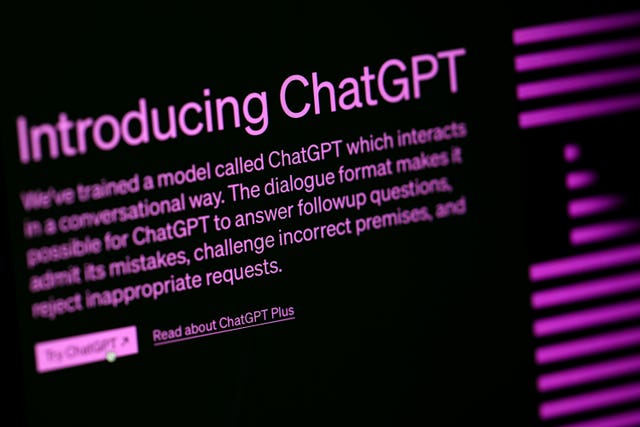
Clive Bull 1am - 4am
28 February 2024, 11:34

A new study suggests a quarter of children are using AI to help with schoolwork, and calls for more Government guidance for parents and teachers.
A quarter of all children are now using generative AI tools to help with schoolwork, according to a new study.
Research from online safety charity Internet Matters found that over half of 13-to-14-year-olds were actively engaging with AI chatbots, and that 41% of children believe AI tools will be beneficial to their education.
But parents are more sceptical, with only 29% agreeing the technology was helpful.
The charity has called on the Department for Education (DfE) to provide more advice and support to schools to help teachers, parents and pupils benefit from AI tools and understand the potential benefits and limitations, while also using the technology safely.
Generative AI tools, such as ChatGPT and Google’s Gemini have become increasingly prominent in daily life over the last year, with the technology seen by many as being an innovation that could rival the creation of the internet in its impact.
Social media platforms including Meta, Snapchat and Elon Musk’s X have also entered the AI space with their own chatbots.
Internet Matters co-chief executive, Carolyn Bunting, said: “Generative AI is here to stay and tools like OpenAI’s ChatGPT and Snap’s My AI are increasingly a part of children’s lives.
“Already a quarter of children are using AI for schoolwork and nearly half of 13-14-year-olds are using AI tools regularly.
“With just a few prompts, an entire essay can be crafted, or an image can be generated, fundamentally changing the way we produce and share content, and how children learn.

“However, our survey shows that both parents and children are unprepared for the AI revolution and most have many unanswered questions about the impact of AI on their daily lives, their children’s safety and wellbeing online, their education, and their futures.
“Many are being left in the dark by the lack of guidance for schools, and it is clear more support, guidance and training is needed urgently.
“The Department for Education’s recent work on AI policy and regulation in schools is welcome, but too narrow.
“Fundamental questions about how children can and should interact with generative AI need to be considered.
“Not least of which is how AI will impact the nature of their education, exams, teaching and homework – these are no longer talking points for the future – rapid change is happening now.
“Government must provide more advice and support in the immediate term to schools to support teachers, parents, and children to benefit safety from the worthwhile applications of AI tools.”
A poll distributed by the International Baccalaureate (IB) also found that 43% of young people said they had used artificial intelligence to help with their schoolwork.
The poll, which ran in November and December 2023, received more than 2,000 responses from students in UK schools that offer the IB.
More than half of the respondents were in state schools.
It found that 72% of students said they had used an AI Chatbot before while 13% of students who responded to the poll believed it is still possible for their education system to avoid the influence of AI.
IB director general Olli-Pekka Heinonen said: “As educational leaders, we can’t attempt to hold back the inevitable tide and so must make sure that AI is used and developed for the purposes of teaching and learning.
“We need to be intentional about how we approach students’ use of AI and how we moderate it.
“School is the right place to learn how AI can be used ethically and sustainably and to understand its strengths and weaknesses.”